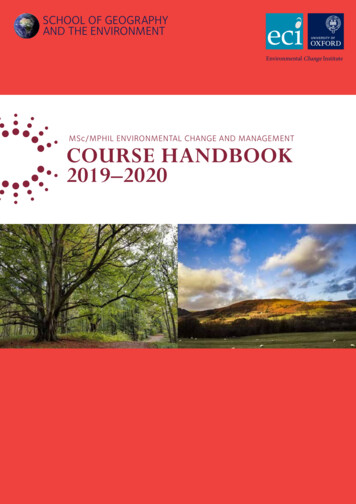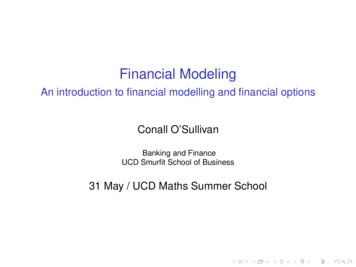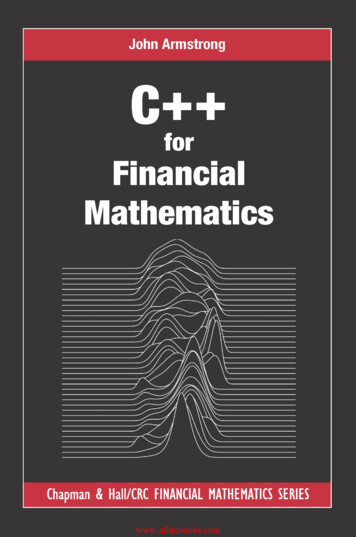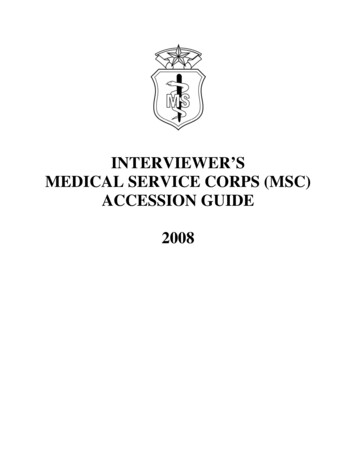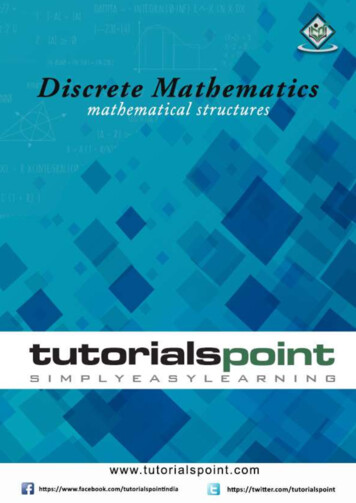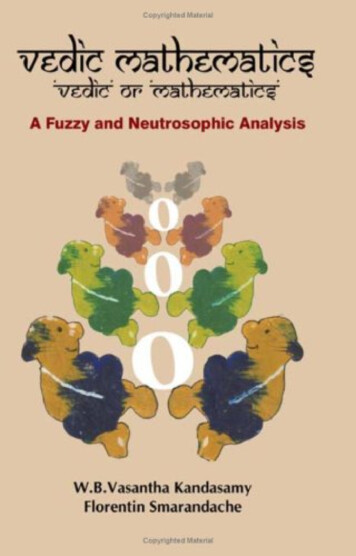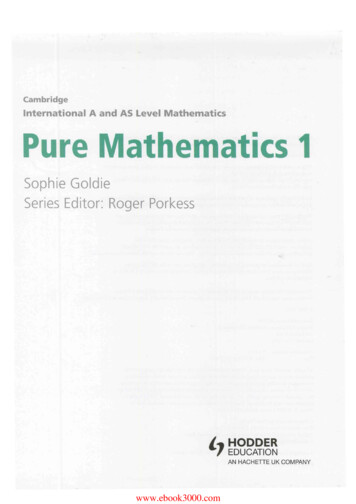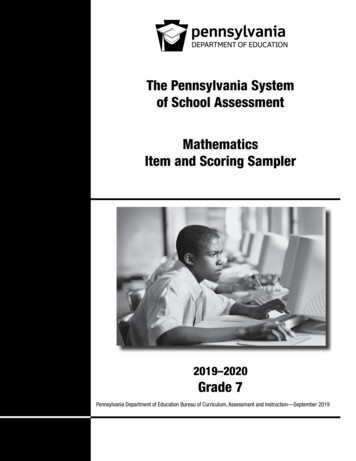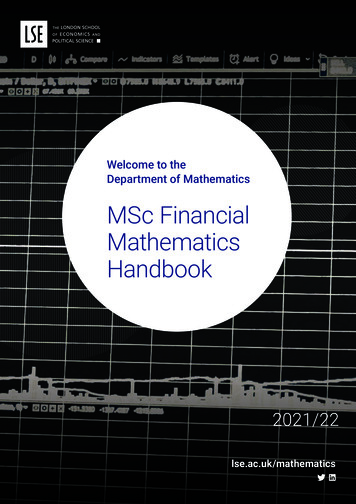
Transcription
Welcome to theDepartment of MathematicsMSc matics
COVID-19SECURELook after yourself. Look after others.2MWear a maskWash or sanitisehands regularlyKeep a safe distance andfollow advice on campusCover coughsand sneezesUse learningspaces safelyLet LSE know ifyou feel unwellDo you have symptoms?37.5 High temperature, fevershaking or chillsLoss of sense of smell, taste,or breathing difficultiesDry coughGet a COVID-19 test, DO NOT go outand you MUST self-isolate for ten days.Thanks. Together we help make LSE COVID-secure.Campus safety, testing information and more: lse.ac.uk/coronavirus
KEY INFORMATION1ContentsDepartment of Mathematics4 Welcome from the Head of Department5 Key Staff7 About the Department8Research Interests of Staff11 Studying and Academic Support14 Programme Structure15 Timetable Outline16 Course Selection and Timetables18 Assessment21 Assessment Criteria23 Feedback24 Useful Links25 Personal and Professional Development27 Jargon Buster28 Useful Informationstudenthub.lse.ac.uk/welcome
KEY INFORMATION2Contents (continued)29 Key Information30 Term dates and LSE closures – Academic Year 2021/2231 Online Pre-Enrolment and Campus Enrolment31 Your LSE Card35 Student Services Centre37 Student Representation39 Quality assurance40 LSE Services to support you with your studies and in your career47 Equity, Diversity and Inclusion (EDI)49 Your wellbeing and health53 Exams and Assessments56 Assessment Misconduct and Plagiarism57 Results and classification59 Fees and finance61 Codes and Charters65 Systems and online resources69 LSE Campusstudenthub.lse.ac.uk/welcome
KEY INFORMATION4Welcome from the Head of DepartmentWelcome to the Department of Mathematics at LSE.By joining one of our degree programmes, you become a member of a vibrant intellectualcommunity, comprising excellent students (BSc, MSc and PhD), world-leading faculty,experienced professional services staff, and high-achieving alumni. By taking advantageof the rich and diverse learning environment at LSE, you will further develop your talentsand advance your knowledge. We want to offer a supportive and friendly environment inwhich everybody can fulfil their potential.The last 18 months have been a strange period, where most of our life seems to happenonline. At the time of writing (June 2021) we are hopeful this coming year we can do amajor part of our teaching and support activities face-to-face on campus again. Sincethe start of the COVID-19 pandemic we have been designing a portfolio of activities thatgives our students a rewarding and supportive learning environment. Several of theactivities are aimed at making sure that you get to know your fellow students and othermembers of the LSE community. We strongly encourage you to engage with thoseactivities. Not everything will be “normal” again this year, but that doesn’t mean itshouldn’t be exciting.The Department’s teaching and research are shaped to a large extent by its positionwithin LSE, a world-leading social sciences institution engaging with the whole world.Within this environment we view teaching and research as complementary activities,each enhancing the other, and we want to be excellent in both.In this handbook you will find a wealth of information about your degree programme,your studies, the support the Department and LSE offer, and much more. Our website(lse.ac.uk/Mathematics) provides further and up-to-date information, including newsand events, and a section for current students in the Department.Finally, if at any point during your time with us you feel that there is something I shouldbe aware of regarding your experience in the Department of Mathematics or at LSE(good or bad), do not hesitate to contact me, by email or in person. My door is alwaysopen, whether it’s a virtual door, or the door of my office.Professor Jan van den HeuvelHead of Departmentj.van-den-heuvel@lse.ac.uk
KEY INFORMATION5Key StaffDr Christoph Czichowsky is the Programme Director for this degree.After your individual Academic Mentor, he is your main contact foracademic queries.c.czichowsky@lse.ac.ukRebecca Batey is the MSc Programmes Manager for all MScprogrammes in the Department. She is your main contact for anyadministrative queries.r.batey@lse.ac.ukProfessor Jan van den Heuvel is the Head of the Department. He isresponsible for all academic activities, students, staff and programmesoffered by the Department.j.van-den-heuvel@lse.ac.ukOther Professional Services Staff you may need to know are:Kate Barker – Department ManagerSarah Massey – Communications and Student Experience OfficerVacant – Teaching Support OfficerPlease check the departmental website for a full list of academic staff, their researchinterests, office hours and contact ematics/current-students/office-hours
KEY INFORMATION6NameDr Ahmad AbdiEmaila.abdi1@lse.ac.ukProfessor Peter Allen **p.d.allen@lse.ac.ukProfessor Martin Anthonym.anthony@lse.ac.ukDr Galit Ashkenazi-Golang.ashkenazi-golan@lse.ac.ukDr Tuğkan Batut.batu@lse.ac.ukProfessor Julia Böttcher **j.boettcher@lse.ac.ukProfessor Graham Brightwell *g.r.brightwell@lse.ac.ukDr Christoph Czichowskyc.czichowsky@lse.ac.ukDr Albina Danilovaa.danilova@lse.ac.ukDr Pavel Gapeevp.v.gapeev@lse.ac.ukProfessor Olivier Gossnero.gossner@lse.ac.ukProfessor Jan van den Heuvelj.van-den-heuvel@lse.ac.ukDr Grammateia Kotsialoug.m.kotsialou@lse.ac.ukDr Ioannis Kouletsisi.kouletsis@lse.ac.ukProfessor Andrew Lewis-Pyea.lewis7@lse.ac.ukDr Arne Lokkaa.lokka@lse.ac.ukDr Neil Olvern.olver@lse.ac.ukProfessor Adam Ostaszewskia.j.ostaszewski@lse.ac.ukDr Katerina Papadakik.p.papadaki@lse.ac.ukDr Emilio Pierroe.pierro@lse.ac.ukProfessor Johannes Rufj.ruf@lse.ac.ukProfessor Amol Sasanea.j.sasane@lse.ac.ukDr Robert Simonr.s.simon@lse.ac.ukProfessor Jozef Skokan **j.skokan@lse.ac.ukProfessor Gregory Sorking.b.sorkin@lse.ac.ukProfessor Bernhard von Stengelb.von-stengel@lse.ac.ukProfessor Konrad Swanepoel *k.swanepoel@lse.ac.ukProfessor László Véghl.vegh@lse.ac.ukProfessor Luitgard Veraartl.veraart@lse.ac.ukDr James Wardj.m.ward@lse.ac.ukDr Nicola Witturn.wittur@lse.ac.ukDr Giacomo Zambellig.zambelli@lse.ac.ukProfessor Mihail Zervosm.zervos@lse.ac.uk* unavailable for MT 2021/22** unavailable for ST 2021/22
KEY INFORMATION7About the DepartmentThe LSE Department of Mathematics is internationally recognised for its teaching andresearch. Located within a world-class social science institution, the Department aimsto be a leading centre for mathematics in the social sciences. The Department’sgrowth trajectory reflects the increasing impact that mathematical theory andmathematical techniques are having on subjects such as economics and finance, andon many other areas of the social sciences. The Department offers seven degreeprogrammes across various levels: undergraduate; postgraduate; and MPhil/PhD.Department OfficeThe Department’s main office can be found on the 4th floor of Columbia House inCOL.4.01. The team is available to assist with general enquiries as well as studentsupport, submission of course work and other non-academic queries.During a normal term time, the office would be open between:10am – 12 noon and 2-4pm.Postal address:Department of Mathematics, COL.4.01The London School of Economics and Political ScienceHoughton StreetLondonWC2A 2AEEmail: maths.info@lse.ac.ukEmailThe School will use your LSE email address to communicate with you so you shouldcheck it regularly. You can access this off campus using Webmail. If on campus, theemail program Microsoft Outlook is available on all student PCs on the LSE network.Twitter, LinkedIn, Blog and Student Hub You can follow the Department of Mathematics’ Twitter account here: @LSEMaths You can also follow our LinkedIn page and connect with our alumni community The Department runs a research blog: blogs.lse.ac.uk/maths/ We are also on the Student Hub app! Our main departmental page can be found here:studenthub.lse.ac.uk/channel/56
KEY INFORMATION8Research Interests of StaffDr Ahmad AbdiPolyhedral combinatorics, packing and covering, ideal clutters, integer programming,matroid theory, graph theory.Professor Peter AllenExtremal combinatorics, especially graphs and uniform hypergraphs, asymptoticenumeration, Ramsey theory, random discrete structures.Professor Martin AnthonyMathematical aspects of the theory of machine learning and Boolean functions.Dr Galit Ashkenazi-GolanDynamic games, repeated games, stochastic games, games with incomplete information,games with imperfect monitoring and games with Borel measurable payoffs.Dr Tuğkan BatuAlgorithms and theory of computation, randomised computation, sublinear algorithms,property testing, and streaming algorithms.Professor Julia BöttcherExtremal combinatorics, random discrete structures, pseudo-randomness, Ramseytheory, regularity method, packing.Professor Graham BrightwellCombinatorics, especially partially ordered sets and random combinatorial structures.Markov chains and discrete stochastic processes.Dr Christoph CzichowskyFinancial mathematics, stochastic analysis, transaction costs, market frictions.Dr Albina DanilovaAsymmetric information, derivative pricing, stochastic calculus, insider trading,stochastic control, equilibrium theory.Dr Pavel GapeevOptimal stopping and stochastic control, applications in finance and statistics,stochastic analysis, stochastic games, credit risk theory.
KEY INFORMATION9Professor Olivier GossnerGame theory, economics of information, decision theory, repeated games,bounded rationality and complexity.Professor Jan van den HeuvelDiscrete mathematics in general, especially graphs, networks and matroids,applications and algorithmic aspects.Dr Grammateia KotsialouAlgorithmic game theory, economic mechanism design, game theory,congestion games, algorithms, complexity, auctions.Professor Andrew Lewis-PyeLogic, computability, algorithmic randomness, network science, complex systems,cryptocurrencies.Dr Arne LokkaPricing and hedging of derivatives, optimal execution, optimal portfolio theory,equilibrium modelling, stochastic optimal control.Dr Neil OlverAlgorithms, with an emphasis on optimization in networks, as well as links togame theory (especially traffic) and probability.Professor Adam OstaszewskiMathematical finance, in particular real options and accounting theory,including corporate disclosure policy. Bargaining theory.Dr Katerina PapadakiOptimisation algorithms for wireless network problems, drone routing problems,patrolling games for network security, approximate dynamic programming algorithms.Dr Emilio PierroFinite group theory, groups of Lie type, generation of finite simple groups,geometric group theory and combinatorics.Professor Johannes RufThe modelling of dynamic systems that arise in finance and economics.
KEY INFORMATION10Professor Amol SasaneApplicable analysis, in particular algebraic analytical questions for topological rings,systems of partial differential equations, and applications in theoretical physics.Dr Robert SimonErgodic Theory, Banach-Tarski Paradox, Game, Theory, Algebraic Topology,Principal-Agent Problems, Chaos Theory.Professor Jozef SkokanCombinatorics, graph theory, discrete geometry, extremal set theory.Professor Gregory SorkinRandom graphs, discrete random structures, combinatorial optimisation,phase transitions, probability. Applications in engineering, OR, other areas.Professor Bernhard von StengelGame theory, equilibrium computation, algorithms, linear inequalities,discrete mathematics.Professor Konrad SwanepoelCombinatorial and discrete geometry, convex geometry and the geometry ofnormed spaces, shortest geometric networks.Professor László VéghAlgorithms and optimization, algorithms for problems related to network design,and equilibrium computation, particularly on strongly polynomial computability.Professor Luitgard VeraartFinancial mathematics, statistics in finance, risk management, systemic risk, networks,financial regulation.Dr Nicola WitturInformation Theory, Game Theory (Repeated Games and Entropy).Dr Giacomo ZambelliCombinatorial optimisation, integer programming, mathematical programming,operations research.Professor Mihail ZervosMathematical finance and economics, stochastic control and optimisation,stochastic analysis.
KEY INFORMATION11Studying and Academic SupportYour Academic MentorAt the start of term all students will be assigned an Academic Mentor. Your AcademicMentor will: Provide you with academic guidance and feedback on your progress and performance Discuss any academic problems you may be experiencing Provide pastoral support on non-academic issues and refer you, as necessary, tosources of support within the School Meet with you regularly and maintain regular contact with you outside of meetings Likely be one of the people that will write reference letters for you in future, so it isimportant that they get to know you well.During your first few weeks, you must contact your Mentor to discuss and agree yourchoice of courses. After this initial meeting, you should arrange other meetings withyour Mentor at least once or twice in each term. They will contact you to set up thesemeetings, unless you wish to discuss something more urgently.Mentors will be able to discuss with and advise you on a range of academic andpastoral issues. These can include: academic progress; course choices; deferral;exams; and personal circumstances. Academic Mentors are also one of the firstfaculty points of contact if you are facing difficulties with your studies. AcademicMentors will treat all information you give them with the appropriate level ofconfidentiality, although sometimes it may be necessary for your Mentor to discussinformation with other relevant members of staff.Note that your Academic Mentor is not responsible for assisting you withadministrative problems. If something is wrong with your registration, timetable, etc,you should contact the Student Services Centre or Rebecca Batey.
KEY INFORMATION12Programme DirectorThe Programme Director for the MSc in Financial Mathematics for this year isDr Christoph Czichowsky.The Programme Director is in overall charge of the tutorial system for your degree, and isalso responsible for monitoring the progress of students. They approve outside options,as well as any special arrangement requests.In most cases you should consult your Academic Mentor before seeing the ProgrammeDirector. If you have difficulties communicating with your Academic Mentor, you cancontact the Programme Director to discuss the situation further. In exceptionalcircumstances, where you feel the Programme Director is unable to help, you arewelcome to instead consult the Head of Department.Equity, Diversity and InclusionThe School’s commitment to equity, diversity and inclusion is one of its strategicpriorities and one of the core principles set out in the School’s Ethics Code.Find out more about our Equality Officer in the Department of Mathematics here:lse.ac.uk/mathematics/ediLectures and SeminarsMathematics courses taught by the Department are taught by means of lectures andseminars/classes. For each course there are usually two lectures per week duringthe two main teaching terms (most half-unit courses run for one term/11 weeksof teaching). For each course, you will also be assigned to a seminar once a week,which normally start in week two of the term and attendance is compulsory. Teachingarrangements on courses run by other departments may be different, so check thecourse guide for more information.
KEY INFORMATION13Postgraduate Study RoomAt the time of writing, capacity in the MSc Study Room for 2021/22 may be reducedin line with health and safety measures. We will provide further information when itis available.During a normal term, you will have access to the Department of Mathematics studyroom for MSc students. This room is COL.2.12 (on the 2nd floor of Columbia House)and is available 7am – 12 midnight on weekdays, and 8am – 10pm on weekends. Youwill need your ID card for access to the building and to the room.Graduation CeremoniesThe Graduation Ceremony for MSc Financial Mathematics students takes place in July,with the ceremony held on campus in the Peacock Theatre. The Student ServicesCentre emails invitations, which include details of the ticket booking process, areemailed to students 5-6 months before the ceremonies are scheduled to take place.The ceremony itself usually lasts 60-80 minutes and is immediately followed by anon-campus drinks reception with the Department.For more information, including the dates of future ceremonies and details of theSchool’s overseas ceremonies, please see: lse.ac.uk/ceremonies
KEY INFORMATION14Programme StructureThis programme lasts for 10 months. Students must take five compulsory half unit (0.5)courses and optional courses to the value of 1.5 units as shown below. There is a twoweek compulsory pre-sessional course: “MA400: September Introductory Course”relating to MA415 and MA417. Students can also take MA422: Research Topics inFinancial Mathematics, which is a non-assessed course that can be taken in addition tothe compulsory and optional courses below.Further half unit(s) from any MA4** courses or any other appropriate MSc course can beselected for Papers 7 and 8, subject to the approval of the Programme Director andTeacher responsible for the course. You can also choose further half unit(s) from thoselisted under Paper 6.PaperCourseCourse Title12MA415MA4163456ST409FM413MA417One of the following:The Mathematics of the Black and Scholes Theory (0.5)The Foundations of Interest Rate and Credit RiskTheory (0.5)Stochastic Processes (0.5)Fixed Income Markets (0.5)Computational Methods in Finance (0.5)7&8MA402Game Theory I (0.5)MA411Probability and Measure (0.5)MA420Quantifying Risk and Modelling Alternative Markets (0.5)Courses to the valueof 1.0 units from:FM402Financial Risk Analysis (0.5)FM404Forecasting Financial Time Series (0.5)FM429Asset Markets (0.5)FM430Corporate Finance and Asset Markets(1.0)FM441Derivatives (0.5)FM442Quantitative Methods for Finance and Risk Analysis (0.5)FM445Portfolio Management (0.5)FM472International Finance (0.5)ST422Time Series (0.5)ST429Statistical Methods for Risk Management (0.5)
KEY INFORMATION15Timetable OutlineThe table below indicates which term(s) relevant courses will fall under during the2021/22 academic year. Compulsory courses are underlined.Michaelmas TermLent TermPapers 1 - 5MA415: The Mathematics of the Black MA416: The Foundations of Interest Rateand Scholes Theoryand Credit Risk TheoryST409: Stochastic ProcessesFM413: Fixed Income MarketsMA417: Computational Methodsin FinancePaper 6MA402: Game Theory IMA420: Quantifying Risk and ModellingAlternatives MarketsMA411: Probability and MeasurePapers 7 - 8FM402: Financial Risk AnalysisFM429: Asset MarketsFM430: Corporate Finance and Asset MarketsFM442: Quantitative Methods forFM441: DerivativesFinance and Risk AnalysisFM445: Portfolio ManagementST422: Time SeriesST429: Statistical Methods for RiskManagementFM472: International Finance
KEY INFORMATION16Course Selection and TimetablesWhen to select your coursesCourse selection will open for browsing on Monday 13 September and will openfor selection on Monday 20 September at 10am. Course selections need to bemade by Monday 4 October at 5pm. You will be able to make changes to Lent Termhalf-unit courses early in Lent Term. For more information, please check thecourse selection webpages. Note that courses you have taken in MichaelmasTerm cannot be dropped in Lent Term.How to select your coursesVisit Finding Courses to access the tools and information to help you decide whichcourses you want to take this academic year. The LSE Course Finder tool can helpyou choose which courses to take within your programme regulations, and is usuallyavailable from late August. Course Finder allows you to browse available courses byunit value, keyword, department and assessment type. You may also wish to lookat course content on Moodle and check the teaching timetable to detect potentialclashes. Some departments have controlled access or capped courses which meansthat places are limited. Make sure that you identify a few back-up courses in case yourfirst choices are not available.The LSE calendar is the place to check for programme regulations, detailing whichcourses you are permitted to take. You will need to select your courses on LSE For Youonce the system opens. Guidance on how to do this can be found on here. Providingyour selected courses are ready in Moodle, you should be automatically enrolled ontheir Moodle pages a few hours after selecting your courses on LSE For You. You mustselect compulsory courses for your programme in addition to your optional ones.Should you have questions about a particular course the most efficient strategy is toput them to the Course Convenor. If you have any queries about the programme itselfor need advice on the course selection process you can contact the MSc ProgrammesManager, Rebecca Batey, on r.batey@lse.ac.uk
KEY INFORMATION17Lent Term Course SelectionCourse selection will re-open at the start of Lent Term. You are able to change yourLent Term courses during the first two weeks of Lent Term provided the newly chosenhalf unit courses are not oversubscribed. Late course changes are not permitted inLent Term once course selection has closed. We strongly advise that you do notchange more than one half unit course during this period.Getting helpFor queries about the course selection process, you can contact the Student ServicesCentre (SSC) via their enquiry form. The SSC can help if you are experiencing issueswith the LSE for You system. If you are not able to access LSE for You, you can contactTech Support.If you have a question about Moodle, please contact eden.digital@lse.ac.ukFor advice around which courses to take and how your programme fits together pleasecontact your Academic Mentor or Rebecca Batey.
KEY INFORMATION18AssessmentThis section is about the various forms of assessment you might encounter duringyour studies. Formative assessment takes place on all courses, but does not count towards yourfinal results. In mathematics courses, this will usually take the form of exercises. Summative assessment can take several different formats, and does count towardsyour final results. Most MSc courses are primarily assessed by an unseen writtenexam in the Summer Term, or a project or a piece of coursework. A half unit course(0.5) is usually assessed by a two-hour exam and a full unit course (1.0) by a threehour exam.Please note in order to be considered for a degree, a student must have attemptedand completed all components of summative assessment as outlined in theTaught Masters regulations.ExamsMost of the courses you will take as part of your degree will be in mathematics. OtherDepartments have their own traditions and arrangements for assessment, andstudents are directed to the appropriate Departments to find more about these.Mathematics courses at LSE are assessed primarily by written, unseen, closed-bookexams, although some courses include assessed projects or coursework. The Departmentof Mathematics has general guidelines on assessment criteria, which provides broaddescriptions of the meaning of marks awarded on our exams. You can read the MScFinancial Mathematics regulations here.Also informative is the national QAA Subject Benchmark Statement for Mathematics,Statistics and Operational Research. Whilst primarily aimed at undergraduate courses,much of what they say will also apply at graduate level.Most exams take place during the summer term (May/June). There is also a Januaryexam period which takes place just before the start of LT. You can check thisinformation via the MSc Course Guides. The exam timetables are published ahead ofthe exam periods, either late Michaelmas or Lent Term.To help you prepare effectively for your exams you should make yourself fully aware ofthe format and syllabus to be covered in the exam. Past papers can be accessed viathe Library web pages (access restricted to LSE network only).
KEY INFORMATION19Marking CriteriaThere are specific assessment criteria for larger pieces of assessed coursework.Smaller pieces of assessed coursework are likely to resemble homework exercises instyle and nature. One purpose of the marking and grading of these earlier in the courseis to inform students about what is expected from them in assessed coursework, aswell as exams.Coursework will be assessed on accuracy and understanding of the material. It is LSEPolicy that students should be given some feedback on assessed coursework. This willoften form “collective feedback”, ie, indications of common errors and parts ofquestions that were answered particularly well or badly. The exact format of suchfeedback is at the discretion of the course convenor.Assessed CourseworkIn some courses, you will be set one or more pieces of coursework, a project orassignments as part of the summative assessment of that course. The lecturerresponsible for the course will tell you the nature of any assessed coursework at thebeginning of the course. They will also mention roughly when the coursework will beset, and the due date for coursework submission.Assessed coursework is marked according to the same procedures as the summativeexams in Summer Term. It usually involves a second Examiner as well as theDepartment’s External Examiner and the marking of coursework is done anonymously.In a normal term, you would submit your coursework and plagiarism statement to theDepartment’s Office. However, for the foreseeable future all coursework anddocuments will be submitted online.Do not write your name or Student ID Number (eg, 202012345) on any piece ofassessed coursework you are submitting – only your 5 digit Examination CandidateNumber (eg, 12345) which can be found on LFY. The Departmental Office will have arecord of candidate numbers and names to ensure that a proper record is kept of thesubmission of coursework.Please note, students who do not submit their summative coursework will beconsidered not to have completed the degree as set out in Paragraph 35 of the GeneralAcademic Regulations here: ations.pdf
KEY INFORMATION20Revise and Submit PolicyIn the event a student fails a summative component and it is retaken, they will berequired to revise and resubmit that work, or required to submit alternative work onwhich they will be assessed, depending on what is most appropriate.Penalties for Late Submission of Courseworkand PlagiarismThe School has a clear and strict policy on the late submission of any assessedcoursework that counts towards your final degree marks. This information is laid out inParagraph 55 of the General Academic Regulations for Taught Masters Degrees.If a student fails to submit by the set deadline (or extended deadline appropriate)the following penalty will apply: 5 marks out of 100 will be deducted for courseworksubmitted within 24-hours of the deadline and a further 5 marks will be deductedfor each subsequent 24-hour period (working days only) until the courseworkis submitted.
KEY INFORMATION21Assessment CriteriaThe Department has the following general guidelines on assessment criteria, whichprovide broad descriptions of the meaning of marks awarded on our exams.Mark (%) Grade Descriptor Characteristics1-9Bad Fail Nothing presented or completely incorrect informationor answers contain nothing at all of relevance No evidence of understanding10-19Bad Fail No competence in core basic techniques of the subject. Very little information or information that is almostentirely incorrect or irrelevant Very little evidence of understanding20-2930-3940-49FailFailFail Very little competence in core basic techniques ofthe subject. Little evidence of understanding Very limited competence in core basic techniquesof the subject. Some understanding evident, but no ability to grapplewith anything other than a limited range of veryroutine questions Limited competence in core basic techniques ofthe subject or competence only in a small part ofthe material. A demonstration of a basic understanding of andcompetence in the subject Some knowledge of, and application of, relevantmethods and techniques50-59Pass A basic range of information and knowledge deployed,with some areas of inaccuracy. A sound understanding of the subject Knowledge of, and some application of, relevantmethods and techniques A stand, and largely accurate, range of informationand knowledge deployed May demonstrate ability to grapple with standardproblems, but limited capacity to solve more unusualor demanding questions involving application ofsignificant understanding of the subject.
KEY INFORMATION22Mark (%) Grade Descriptor Characteristics60-69Merit A clear understanding of the subject Competent application of relevant methodsand techniques Wide and accurate range of information andknowledge deployed70-79Distinction Some capacity to solve more unusual or demandingquestions involving application of significantunderstanding of the subject. A thorough understanding of the subject Deft application of relevant methods and techniques Extensive range and consistent accuracy ofinformation and knowledge80-89Distinction A significant capacity to solve more unusual ordemanding questions, involving application of thoroughunderstanding of the subject and its methods. A deep understanding of the subject Mastery of relevant methods and techniques Highly extensive range and consistent accuracyof information and k
MSc Financial . Mathematics Handbook. COVID-19. SECURE. Get a COVID-19 test, DO NOT go out and you MUST self-isolate for ten days. Look after yourself. Look after others. Wear a mask Wash or sanitise hands regularly Cover coughs and sneezes Keep a safe distance and follow advice on campus. 2M
